Heino Eller: Complete Piano Music, Volume Two
As both composer and teacher Heino Eller (1887-1970) was one of the founders of the classical tradition in his native Estonia. Yet his copious output for piano — some 200 works —is largely unknown, an omission this series of seven CDs seeks to redress. Volume Two presents compositions from six decades: charming romantic miniatures, virtuoso showpieces, expressionist preludes and quirky folk-pieces. The main item is his Theme and Variations from 1939 — one of his best works for piano, but not published or recorded before now.
Sten Lassmann, piano
Listen To This Recording:
- Sonatina in F sharp minor (1950s)
- No. 1 Melody
- No. 2 Music Box
- No. 3 Waltz
- No. 4 Intermezzo
- No. 5 Rondino
- No. 6 Allegro ma non troppo
- No. 7 Allegro
- No. 8 Dance
- Furioso (c. 1914)
- Allegro con fuoco (1914)
- Episode from Revolutionary Times (1917)
- Sostenuto in G minor (1909)
- Allegretto moderato in C minor (1909)
- Chanson triste (1910)
- Andante in E major (1910)
- Larghetto in A major (1909)
- No. 1 Largo e con summa espressione
- No. 2 Lento, lugubre – Più mosso
- No. 3 Sostenuto – Più mosso
- No. 4 Sostenuto
- Theme
- Variation I
- Variation II
- Variation III
- Variation IV
- Variation V
- Variation VI
- Variation VII
- Variation VIII
- Variation IX
- Variation X
- Estonian Dance (1934)
Eight Pieces (1948)
Preludes, Book III (1921t32)
Moderato assai (Theme and Variations) (1939)
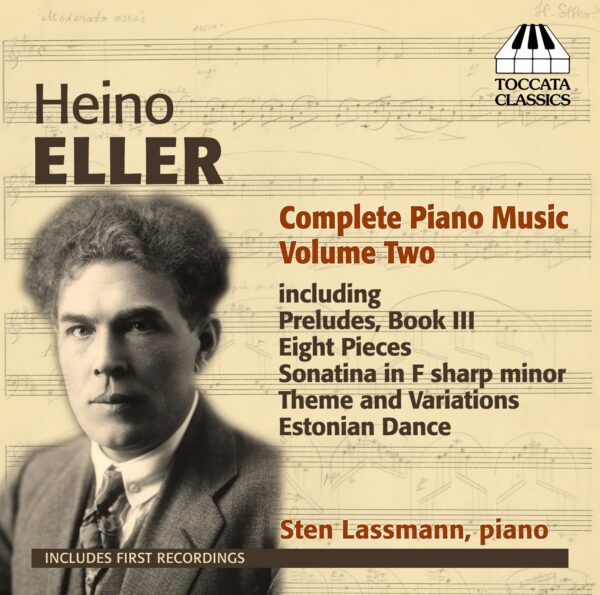
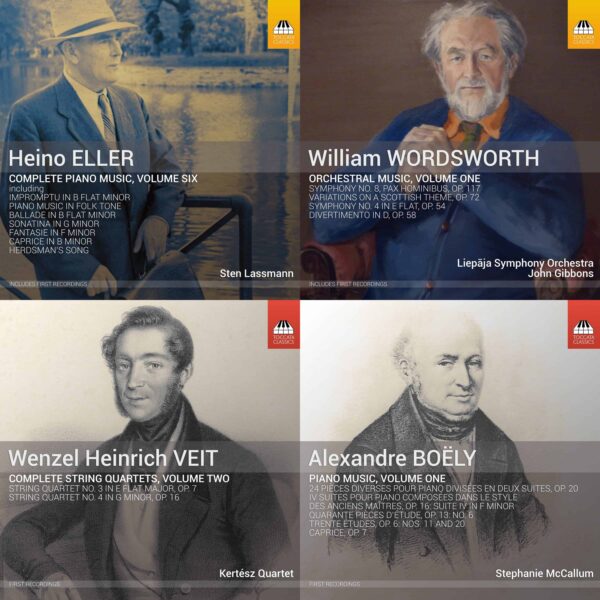
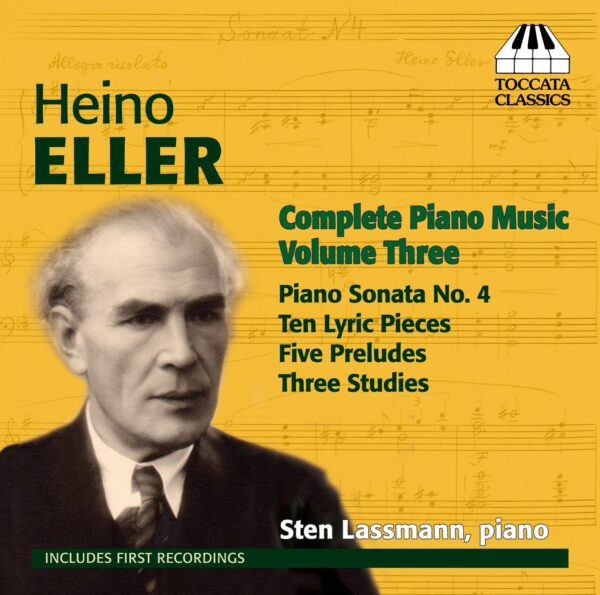
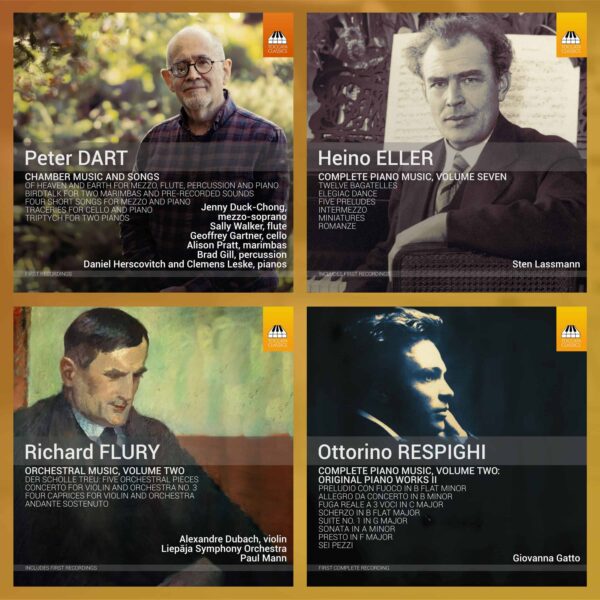
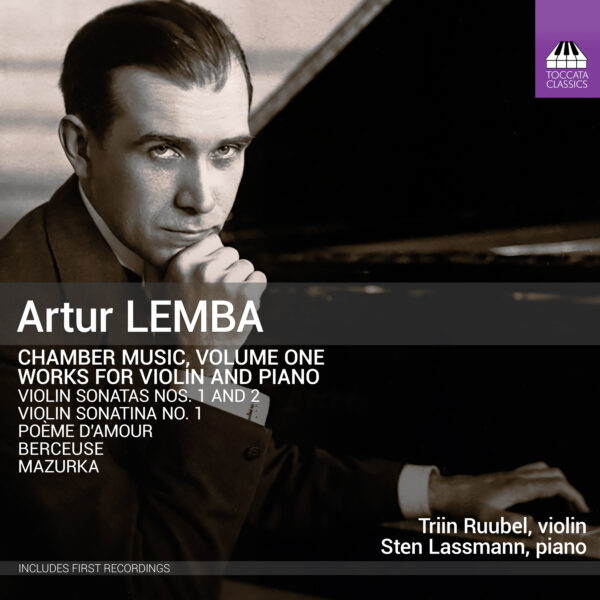
Expedition Audio :
‘… I was drawn to Eller’s music from the opening tracks, and only became more enamored as the music played on. The deal that this would be an Uncommonly Classical recommendation was sealed about 25 minutes in as I listened to the potent and darkly beautiful Episode from Revolutionary Times (1917). This alone is worth the price of the CD. … Performances by pianist Sten Lassmann … are excellent. …’
—Paul Ballyk, Expedition Audio
MusicWeb International :
‘…It’s immediately approachable, unacademic but is not frivolous; there are hints of Grieg and of Chopin, and there is a small but slight folkloric inheritance too. It’s the fresh Sonatina, composed at some time in the late 50s, that reveals the lyric freshness of his writing and the hints of folklore. There’s no development section as such, but this easy-going work is an ideal introduction to Eller, for whom nothing was doctrinaire. …Clearly Eller was channelling Lisztian virtuosity in this period [1909-1917] and in the more reflective ones, Chopin. One piece stands apart, the big, brooding Episode from Revolutionary Times, a large-scale funeral march that opens like Liszt’s Sonata and offers a brief moment of reprieve along its gloomy process. It’s impressively sustained. …Lassmann proves a faultless guide throughout this volume, relishing the opportunities for crispness and geniality provided by Eller.’
—Jonathan Woolf, MusicWeb International
Sirp :
‘Kuid Elleri klaveriteoste tihe polüfooniline kude Sten Lassmanni eripäraselt intellektuaalses esituses kinnitab selle rahvuslik-modernistliku muusika täielikku suveräänsust, Elleri- ja eestipärasust. Selles on pigem assotsiatsioone põhjamaise juugendliku rahvusromantilise arhitektuuri ja maalikunstiga. Eeskätt on huvitav Elleri eripärane tehnitsism: on palju virtuooslikku faktuuri modernistlikule muusikale omase meloodika ja harmooniaga. Sten Lassmanni tähelepanelikult faktuuri tõlgendav kunstikeel on Elleri klaverimuusikaga tihedalt kokku kasvanud: detailide pideva minimaalse muutumise varjundid interpretatsioonis on talle tähtsad ja kohati intonatsioonilt täiuslikud. […]
Sten Lassmann on pisut enam kui 40 aastat pärast Heino Elleri surma elustanud tema klaverimuusika sedavõrd esileküündivas mahus ja tõlgenduses, et see lubab liialdust kartmata märgata huvitavat Felix Mendelssohn-Bartholdyga seotud paralleeli J. S. Bachi (1685–1750) loomingu elustamisel saksa kultuuris ligi 80 aastat pärast Bachi surma, nimelt „Matteuse passiooni” BWV 244 esitusega Berliinis 1829. […] See on ideaalne sissejuhatus Elleri muusikasse, milles ei ole olnud midagi doktrinaarset.’
English translation:
‘However, the dense polyphonic weave of Eller’s piano works in Sten Lassmann’s distinctively intellectual performance confirms the complete sovereignty of this national-modernist music, its Ellerian and Estonian identity. It rather has associations with Nordic Art Nouveau national-romantic architecture and painting. Eller’s distinctive technicality is especially interesting: there is a lot of virtuoso texture with the melody and harmony typical of modernist music. Sten Lassmann’s artistic language, which carefully interprets texture, has grown closely with Eller’s piano music: the shades of the constant minimal change of details in the interpretation are important to him and at times perfect in intonation. […]
A little more than 40 years after Heino Eller’s death, Sten Lassmann has revived his piano music in such a groundbreaking volume and interpretation that it allows us, without fear of exaggeration, to notice an interesting parallel with Felix Mendelssohn-Bartholdy in the revival of the work of J. S. Bach (1685–1750) in German culture nearly 80 years after Bach’s death, namely with the performance of the St. Matthew Passion BWV 244 in Berlin in 1829. […] This is an ideal introduction to Eller’s music, which has nothing doctrinaire about it.’
—Maris Valk-Falk, Sirp